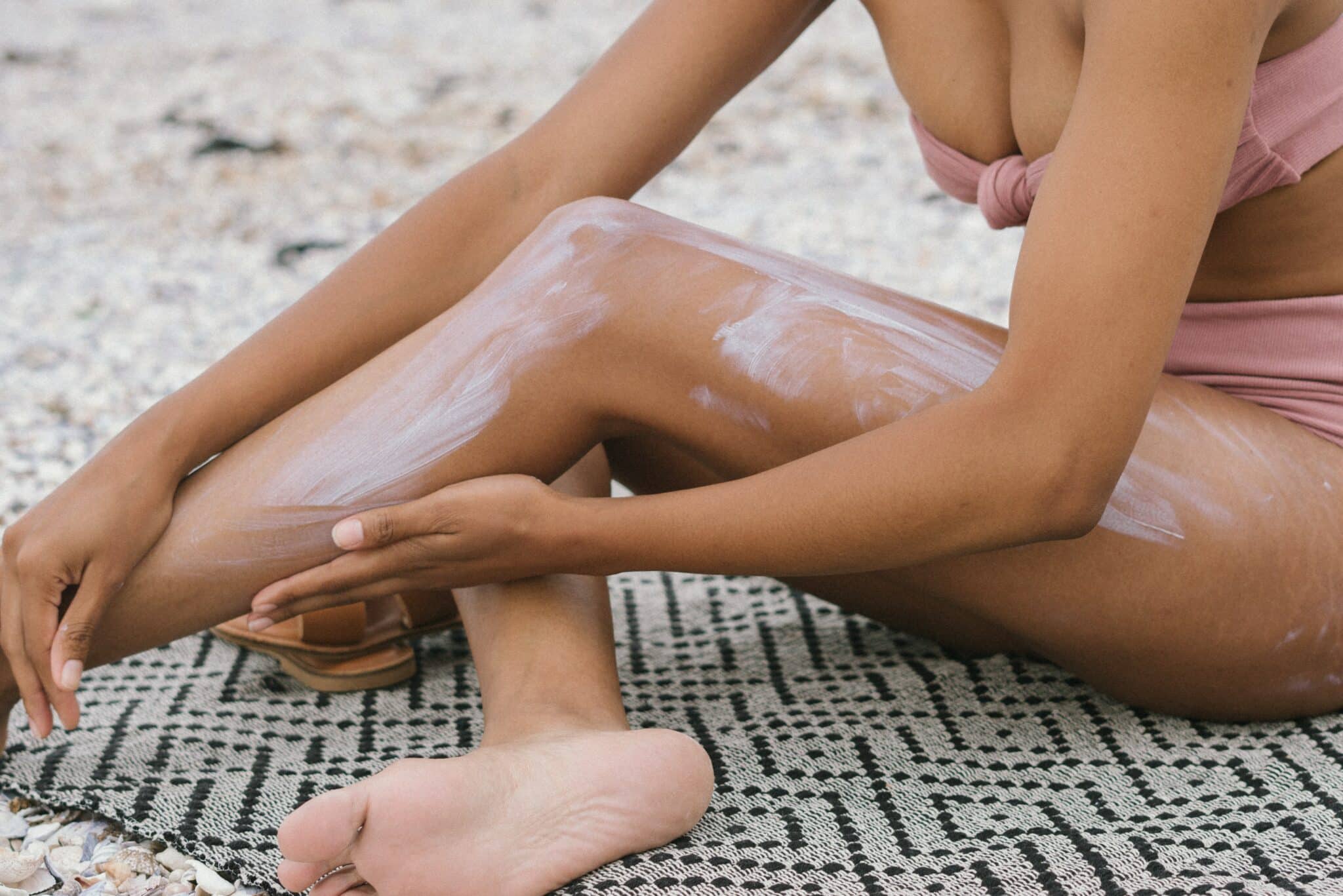No one, absolutely no one, wants sun damage. That’s why we always have a bottle of sunscreen when heading to the beach.
If it’s broad-spectrum, it protects you from two types of UV light that are UVA and UVB rays. Use sunscreen and moisturizer to get sun protection while hydrating your face.
Substituting one for the other, more so in winter, can leave your face prone to UV rays. You’d get similar side effects when using a moisturizer with SPF, as the sun protection in it is low when you apply it insufficiently. Your face may age prematurely in the long term.
So, can I use sunscreen as a moisturizer? No, and we’ll explain what we found out below.
Can I Use Sunscreen as a Moisturizer?

You may be wondering, are moisturizers and sunscreen the same? No, each product’s formulation brings something different to your skincare routine.
Moisturizers have emollients and humectants. The former traps moisture to maintain the hydration level of the top layer of your skin.
In contrast, humectants attract moisture from the environment to maintain skin hydration. These humectants include glycerin, honey, and aloe vera, while popular emollients are lanolin and mineral oil.
When sunbathing, your skin needs nourishing agents that enhance hydration and reduce moisture loss. If you don’t apply a moisturizer, you’re likely to get dry, rough skin.
But you also require sunscreen as its purpose is blocking sun rays, and it does so based on its sun protection factors (SPF). In the real sense, you can use sunscreen only and skip moisturizer as it has hydrating properties. However, you can’t get rid of sunscreen and depend on your moisturizer for sun protection.
Your skin absorbs moisturizer to nourish and hydrate it, but it doesn’t need to absorb sunscreen since sunscreen creates a barrier between your skin and the sun.
Further, sunscreen undergoes stringent regulatory policies as it’s a drug. Therefore, it should be labeled appropriately, contain water resistance and sun protector ingredients.
Plus, use sunscreen even when applying makeup as products may claim to have sun protection, yet it’s insufficient.
What About Moisturizers With SPF?

When you buy moisturizer and sunscreen as separate products, there’s no need to combine them into one product.
Instead, choose a product formulated with both as a moisturizer with SPF. This one is easy to carry as it takes less space in your bag, unlike when you have a full-size sunscreen and a bottle of moisturizer.
It’s also cost-effective compared to getting the two products separately. You’ll also have one list of ingredients to worry about, and if your skin reacts, there’s only one possible cause.
But, applying sunscreen and moisturizer as two different products is so much better for your skin because, as we mentioned, they have unrelated purposes.
What Should You Apply First: Sunscreen or Moisturizer?

How you layer your skincare products, such as moisturizers and sunscreen, determines how you protect your skin.
Two factors control this decision. Firstly, if you apply your sunscreen first, will the moisturizer affect how the sun protectant works?
Secondly, if you apply the moisturizer first, will the sunscreen reach your skin?
Well, the process of sun protection depends on the type of sunscreen. You either have a chemical or mineral-based sunscreen. If it’s a chemical sunscreen, it absorbs UV light. Some common chemical ingredients are avobenzone and oxybenzone.
On the other hand, a mineral-based sunscreen reflects these rays. You’ll know you have a mineral sunscreen if its ingredients include zinc oxide or titanium dioxide.
Consequently, if you’re using a chemical-based sunscreen, layer it before applying a moisturizer so that it can penetrate your skin. If applied second, the moisturizer might interfere with sunscreen absorption, meaning no sun protection.
On the other hand, a mineral-based one goes on your skin after moisturizer to create a sun-protection barrier to reflect UV rays.
Since mineral-based sunscreen is gentler and more effective, that’s what we’ll focus on, meaning you should apply your moisturizer first. It’s not a rule cast in stone, but it’ll protect your skin.
How to Wear Sunscreen Correctly

Reapply every two hours to renew sun protection. If you’re swimming or sweating, do so every 80 minutes.
Let your skin absorb moisturizing agents for at least a minute before layering with sunscreen. That’ll give it time to form a protective barrier. It’ll also dry well so that you don’t wipe it off as you apply your sunscreen.
When using sunscreen or moisturizer with SPF, it should have SPF 30 or higher. Apply it generously without missing any spots. If you do, you’ll miss the benefits of SPF 30 or higher.
One study found that people miss the same spots increasing their risk of cancer and aging. More people forget the lips, neck, chest, and ears. Are you one of them? There’s also a tendency to miss spots when applying moisturizer with SPF than sunscreen.
Lastly, add sunscreen to your daily skincare routine so that you don’t have days of sun damage when you skip it. That could have you treating sunburn on some days. Severe sunburn forms scars and blisters that may heal in more than two weeks. Would you like to stay out of the sun for that long?
Don’t forget to get a lip balm or other lip care product with SPF as your lips also get sun damage.
FAQs
Does sunscreen make you darker?
It can only cause hyperpigmentation if it has ingredients that influence hormonal activity or a physical effect that makes you darker. These two situations may arise when using a chemical sunscreen or ingredients like oxybenzone.
Overall, a good sunscreen protects you from hyperpigmentation when it blocks the sun. The rays increase melanin production as the body shields itself from extreme sun exposure. But, as exposure continues, it damages the melanin cells. That’s why you need sunscreen to block these rays to eliminate cell damage.
Can I apply sunscreen without washing my face?
If you’re applying the first layer of the day, you should wash your face. However, if you’re reapplying, chances are you’ll be outdoors where you can’t wash your face. If that’s the case, you can dab your face with a face towel to remove dirt or sweat then reapply.
Nonetheless, if you sweat a lot, you might have to wash your face first to avoid sealing dirt and dust every two hours.
Can I apply sunscreen without moisturizer?
As we mentioned earlier, they have different benefits. Therefore, when you moisturize first, you hydrate your skin even as the sunscreen blocks damaging rays. After hours in the sun, you’ll still have supple, healthy skin, thanks to the moisturizing ingredients.
Is a moisturizer with sunscreen enough?
Yes, if it has a good SPF, it’ll serve you like sunscreen. But, you have to apply it generously to exposed skin, including your ears and eyelids. As we mentioned, more people miss some spots when using a moisturizer with SPF.
Also, find out if you can bring spray sunscreen on a plane.
Final Thoughts
If you want to age naturally, apply sunscreen. Also, you’ll avoid getting sunburns any time you stay too long outdoors.
But, if you want to have healthy skin that’s aging well, add both sunscreen and moisturizer to your skincare routine. Get SPF 30 or higher to enjoy all the benefits of sunscreen.
Moisturizers with SPF are enticing as you have one less product to carry, especially when traveling. If you remember to apply it evenly, you get enough sun protection. But, the best solution is to have a moisturizer and sunscreen.
Related Articles
14
Jan
When Can You Put Sunscreen on a Tattoo?
We all love to show off our tattoos. No one gets a new tattoo with the intention of hiding that art form from the world. We all love to show off the tattoos on our hands, legs, shoulders... That’s why[...]
14
Jan
Is Blue Lizard Sunscreen Safe to Use?
There are obvious immediate benefits of sunscreen, such as healthy, hydrated skin. Then there are long-term gains that you'll notice years after you start using sunscreen regularly. But, both short and long-term gains depend on the brand you choose. If[...]
13
Jan
Can I Bring Spray Sunscreen on a Plane? What the Rules Say
Since you love and care for your skin, you'll want to carry sunscreen to your next destination. It might also be costly to buy your favorite brand when you arrive. Even more worrying is when you can't find sunscreen your[...]
Categories: Sunscreen
